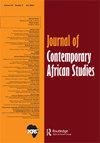Nigeria: a narrative of competing needs between shifting global trend, sustainable transportation, and economic growth
IF 0.8
Q2 AREA STUDIES
引用次数: 2
Abstract
ABSTRACT Nigeria is the biggest economy in Africa and a significant player in the geopolitics of the continent. The country's ability to command so much relevance is based partly on its status as an oil exporter. It is, therefore, imperative that the country's government protects its golden goose, oil. In this paper, we argue that the recent act of the Nigerian government to resist the promotion of electric vehicles (EV) in the country as a way to protect its economic goose is ill advised. We contend that global transportation and energy phenomena suggest that for Nigeria to remain relevant in the future of the world economy, it is pertinent that it pursues a shift from its current economic model. To buttress our claim, we show how embracing sustainable transportation systems like adopting EV promoting policies, can give Nigeria a rare opportunity to be a big player in the future world economy.尼日利亚:关于不断变化的全球趋势、可持续交通和经济增长之间相互竞争的需求的叙述
尼日利亚是非洲最大的经济体,也是非洲大陆地缘政治的重要参与者。该国之所以能够获得如此大的影响力,部分是基于其石油出口国的地位。因此,国家政府必须保护它的金鹅——石油。在本文中,我们认为尼日利亚政府最近抵制在该国推广电动汽车(EV)作为保护其经济鹅的一种方式是不明智的。我们认为,全球运输和能源现象表明,尼日利亚要在世界经济的未来中保持相关性,就必须从目前的经济模式中寻求转变。为了支持我们的观点,我们展示了如何采用可持续交通系统,如采用电动汽车推广政策,可以给尼日利亚一个在未来世界经济中扮演重要角色的难得机会。
本文章由计算机程序翻译,如有差异,请以英文原文为准。
求助全文
约1分钟内获得全文
求助全文
来源期刊

Journal of Contemporary African Studies
AREA STUDIES-
CiteScore
2.20
自引率
0.00%
发文量
18
期刊介绍:
Journal of Contemporary African Studies (JCAS) is an interdisciplinary journal seeking to promote an African-centred scholarly understanding of societies on the continent and their location within the global political economy. Its scope extends across a wide range of social science and humanities disciplines with topics covered including, but not limited to, culture, development, education, environmental questions, gender, government, labour, land, leadership, political economy politics, social movements, sociology of knowledge and welfare. JCAS welcomes contributions reviewing general trends in the academic literature with a specific focus on debates and developments in Africa as part of a broader aim of contributing towards the development of viable communities of African scholarship. The journal publishes original research articles, book reviews, notes from the field, debates, research reports and occasional review essays. It also publishes special issues and welcomes proposals for new topics. JCAS is published four times a year, in January, April, July and October.
 求助内容:
求助内容: 应助结果提醒方式:
应助结果提醒方式:


